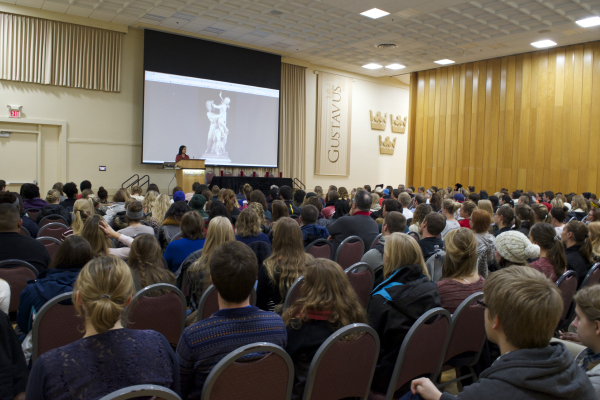Building Bridges hosted a successful preview for its conference called, “The Evolution of Rape,” that took place last Wednesday. Five professors and faculty members spoke and participated in a panel regarding this topic.
The five members of the panel were professors Peg O’Connor, David Obermiller, Alisa Rosenthal, and Yurie Hong, and Dean of Students JoNes VanHecke.
The first talk was by Philosophy and Gender, Women, and Sexuality Studies Professor Peg O’Connor. She set the tone by acknowledging the nature of rape culture and the sensitivity of the topic.
“This is an incredibly difficult topic to talk about,” O’Connor said.
She redefined sexual violence in a way that she found more fitting because the word, “violence” has been overused in our culture. It does not fully describe the connotations of what victims go through.
“Sexual terrorism is a far more apt description of what women and many marginalized men face in our culture. Terrorism breeds a kind of fear. You don’t know when the next attack is coming,” O’Connor said.
Alisa Rosenthal, a Political Science and Gender, Women, Sexuality Studies professor is the faculty advisor for Building Bridges. She was also a member on the panel, addressing the idea of framing rape culture discussions.
“We are trying to get students to think more intentionally and consciously about the ways in which everyone is harmed by rape culture, rather than thinking simply of sexual assault as a problem that affects victims. One reason that rape culture is able to prevail is because it is normalized,” Rosenthal said.
The panel members encouraged students to open their eyes to the rape culture within society, even at Gustavus. O’Connor addressed popular culture’s role in rape culture. She used the example of Katy Perry’s “Last Friday Night” that teaches young adults that there are no repercussions to dangerous activities.
“Pop culture tells us that there are no consequences to sexual terrorism. We need to come up with alternative messages that are empowering to kids,” O’Connor said.
Rape culture is present throughout the United States, but Dean of Students JoNes VanHecke discussed how this issue pertains to Gustavus. At a college level, she discusses the importance of students having the opportunity to the education they desire.
“It’s important because people’s lives are being affected. People’s opportunity for an education is negatively impacted by rape culture,” VanHecke said.
By sparking awareness of the rape culture that exists, the Gustavus community can take the next steps to prevent it.
“At the end of the day, each one of us has the possibility to change rape culture and making a difference,” VanHecke said.
O’Connor offers ways to fight rape culture by recognizing the detrimental aspects of it within popular culture. She asks students to first recognize pop culture to be adding to rape culture and then attempt to avoid becoming a part of it.
“Think about types of resistance to this and ask yourself: how can you be dissidents to pop culture?” O’Connor said.
VanHecke reminded students that all people are involved in rape culture and need to do their part to avoid contributing to it.
“There can be no bystanders in the prevention of sexual misconduct. Each and every one of us on this campus has a responsibility to understand this topic, take part in bystander training, and engage in good practices,” VanHecke said.
She encouraged discussions among peers as well as strong communication between partners in intimate relationships.
“There’s no such thing as too much communication,” VanHecke said.
The panel got students talking about this difficult issue and gave an intriguing and thought-provoking preview to the upcoming Building Bridges Conference.
The Building Bridges topic is different each year and is determined by the co-chairs of Building Bridges in consultation with their faculty advisor. The Building Bridges Conference is titled: “Hidden in Plain Sight: Recognizing and Rejecting Rape Culture” and will take place March 7, 2015.
-Laura Isdahl
